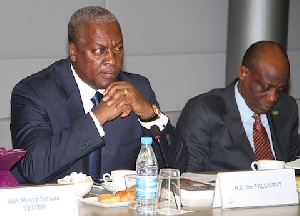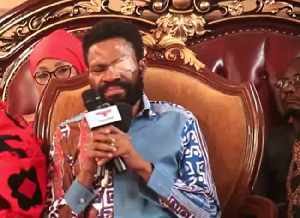For a decade, Ghana powered ahead as it started pumping oil, won debt forgiveness, achieved coveted middle-income status and saw five years of economic growth above 8 percent that made it the envy of other African nations.
Now it has hit a roadblock and Ghanaian officials are set to discuss new policy options at annual meetings of the International Monetary Fund (IMF) and the World Bank in Washington this week.
Those meetings could also see Ghana explore some form of IMF financial support, Finance Minister Seth Terkper told the Reuters Africa Summit.
A weakening currency and a stubborn budget deficit are among problems that are starting to lower the country's growth trajectory and spook investors.
Ordinary people are feeling the pinch not least as cuts to utility and fuel subsidy cuts last year, introduced by the government in a bid to reduce the deficit, helped push inflation to a four-year high of 14.5 percent in March.
Traders at Markola market in Accra routinely travel to southern China for cheap goods, buying dollars on Ghana's foreign exchange market and converting them to Chinese yuan to import everything from fake Armani jeans to kitchenware.
Those business trips are getting pricier because of a 14.6 percent fall in the cedi currency this year caused by unmet demand for dollars for imports and fiscal instability.
"It's very difficult these days. There's no money in the system," said trader Emmanuel Mensah. "The petrol price increase is not helping and the dollar is just going up."
Ghana's economy grew 7.1 percent last year, down from 8.8 percent in 2012, according to government figures. The IMF estimated growth at 5.5 percent in 2013 while the budget deficit stood at 10.8 percent of gross domestic product.
"We are not really seeing Ghana now as the most dynamic economy on the continent," said Carlos Lopes, Executive Secretary of the U.N. Economic Commission for Africa, adding that Ivory Coast and Sierra Leone were more active.
Economists say a radical shift in policy is required to get Ghana's economy back on track. Without it, they warn that bond yields will rise towards 25 percent, inflation will inch higher and the cedi will continue to slide.
The European Union held back around 64 million euros ($88.8 million) in budget support in 2013, saying it doubted the credibility of the fiscal stabilization plan, and it is yet to disburse around 120 million euros available this year for the same purpose.
But it may not be easy to win public support for painful measures including a freeze in public sector wages that Terkper advocated in a major policy speech to parliament last week.
"One of the difficulties we've had, not only this government but also the previous government, is managing the expectations of Ghanaians," President John Mahama told the Reuters Africa Summit this week. "The general feeling was that as soon as Ghana started pumping oil all our problems were going to be solved."
While Terkper favours a wage freeze, the Trades Union Congress (TUC) told Reuters it had asked the government for a 20 percent wage hike. Unions staged pay strikes in 2013.
"They should not only consider the view of the ratings agencies and the markets. They should consider the views of Ghanaians, the people who live here," Yaw Baah, deputy secretary general of the TUC, told Reuters.
Concerns about fiscal policy would matter less if Ghana was still beholden mainly to donors to fund its growth, but analysts say its debt is increasingly held by investors less tolerant of policy weakness.
Ghana has put a planned Eurobond, which could be worth up to $1 billion, on hold in a move economists said was driven by the high yields they would pay given concerns about the economy.
WAGE TALKS
The country of 25 million is viewed as a role model in Africa because of its strong economy, which is based on exports of cocoa, gold and oil and is rooted in a peaceful democracy.
Ministers say financial markets are not giving the government credit for cutting subsidies last year and argue that an interest rate rise and other measures to support the currency will work over time.
Unforeseen factors exacerbated fiscal weakness last year, they say, including a ruptured gas pipeline, falling commodity prices and a prolonged legal battle over a 2012 presidential election.
President Mahama said Ghana's medium-term outlook is rosy as gold prices rise and oil output increases, bringing further revenue to government coffers. As more people join the middle class, consumer spending will also increase.
Terkper acknowledges the need to convince investors, however, and said the government will be discussing options with IMF and World Bank officials.
One person close to the policymaking process said the government could opt for a plan drawn up by the government that included short- and medium-term targets for spending and revenues but was effectively vetted by the IMF.
The government would probably unveil such a plan when parliament returns in May.
"We will be talking to them at this (week's) meetings on various options, including possible assistance programmes," Terkper said.
"We are committed to this 'home grown' programme and we believe it will work."
Economists say a key plank of the plan will be the one-year freeze on public sector wages.
Wage talks between the government and the TUC began in earnest a week ago in a conference room at the national stadium in Accra, but unions show no sign of backing down so far.
Baah said militancy among the TUC's 500,000 members was at its highest level in years.
"We've told government we'll never accept a pay freeze. Never ... we're prepared to fight and fight until we win," he said.
Business News of Sunday, 13 April 2014
Source: Reuters



![New IGP, COP Christian Tetteh Yohonu [L] and immediate-past IGP, Dr. Akuffo Dampare New IGP, COP Christian Tetteh Yohonu [L] and immediate-past IGP, Dr. Akuffo Dampare](https://cdn.ghanaweb.com/imagelib/pics/140/14041582.295.jpg)









